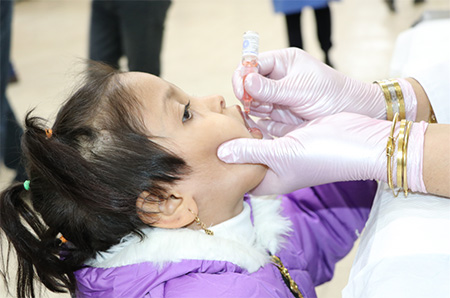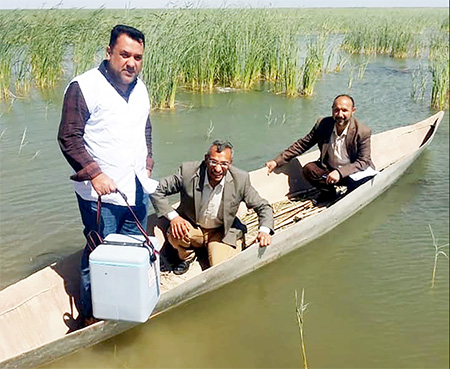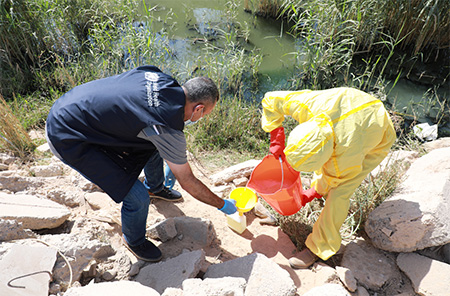 Baghdad, 24 October 2022 — The World Health Organization (WHO), in cooperation with the Ministry of Health, increased efforts to enhance polio eradication activities to protect children and maintain the polio-free status in Iraq.
Baghdad, 24 October 2022 — The World Health Organization (WHO), in cooperation with the Ministry of Health, increased efforts to enhance polio eradication activities to protect children and maintain the polio-free status in Iraq.
Iraq has been certified polio-free since 2017 but is still vulnerable and at high risk of poliovirus importation/ emergence. Iraq is also a destination for frequent mass gathering events, receiving visitors from other countries, including polio-endemic Afghanistan and Pakistan and other countries experiencing circulating vaccine-derived poliovirus outbreaks.
"Maintaining the polio-free status in Iraq is a top priority for WHO and the Ministry of Health in Iraq, especially following the disruption of routine immunization caused by the COVID-19 pandemic," said Dr Ahmed Zouiten, WHO Representative in Iraq. "This year, we have doubled efforts to sustain the achievements made over the past years."
Throughout 2022, WHO scaled up the overall polio eradication activities with different support missions involving global and regional polio experts joining the WHO country office to advance the polio eradication strategies. Several training workshops on polio outbreak preparedness and response were held in Baghdad and all Iraqi governorates, targeting provincial managers of the Expanded Programme on Immunization (EPI), surveillance officers and the National Polio Laboratory staff.
Milestones achieved towards polio eradication
 The year 2022 has seen significant milestones in polio eradication with the establishment of environmental surveillance to complement surveillance among children and acute flaccid paralysis (AFP) cases. WHO and the Ministry of Health successfully launched environmental surveillance in the first two sewage sites in Baghdad. Later, WHO and the Ministry of Health extended the environmental surveillance to the remaining five high-risk governorates based on the national environmental surveillance plan.
The year 2022 has seen significant milestones in polio eradication with the establishment of environmental surveillance to complement surveillance among children and acute flaccid paralysis (AFP) cases. WHO and the Ministry of Health successfully launched environmental surveillance in the first two sewage sites in Baghdad. Later, WHO and the Ministry of Health extended the environmental surveillance to the remaining five high-risk governorates based on the national environmental surveillance plan.
The National Polio Laboratory was accredited by WHO in August 2022, paving the way for further achievements in the field of polio surveillance.
Iraq has also met all readiness requirements for using novel oral polio type 2 vaccine (nOPV2) under the Emergency Use Listing (EUL). The requirements included coordination, vaccine management/ cold chain, surveillance, safety, ACSM (Advocacy, Communications and Social Mobilization), and laboratories.
In addition to surveillance efforts, the protection of children is ongoing, with 5,757,305 OPV and IPV doses administered so far in 2022 to enhance the immunity profile of children in Iraq.
Mainstreaming polio functions into health systems
 In June 2022, the integrated public health functions mission from WHO HQ and the WHO Regional Office for the Eastern Mediterranean (EMRO) visited Baghdad to evaluate the polio transition process in Iraq and commended the efforts made so far and invited Iraq to persevere in improving essential immunization, disease surveillance, and outbreak preparedness and response, both in primary health care centres and beyond.
In June 2022, the integrated public health functions mission from WHO HQ and the WHO Regional Office for the Eastern Mediterranean (EMRO) visited Baghdad to evaluate the polio transition process in Iraq and commended the efforts made so far and invited Iraq to persevere in improving essential immunization, disease surveillance, and outbreak preparedness and response, both in primary health care centres and beyond.
Polio transition planning will provide a clear roadmap to maintain the well-structured networks that have historically contributed far beyond polio eradication, which is crucial in reaching underserved communities in some of the most vulnerable settings, including Iraq.
"With all the achievements made towards polio eradication in Iraq, we are confident to preserve the polio-free status. Yet, we need to be well-prepared to avert any possible polio circulation," Dr Zouiten affirmed.




